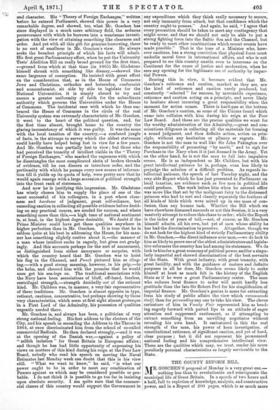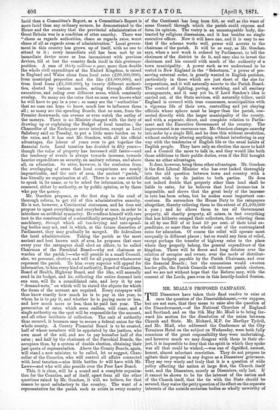THE COUNTY REFORM BILL.
GOSOHEN'S proposal of Monday is a very great one,—
nothing less than to revolutionize and reinvigorate the municipal life of Great Britain. In a speech of two hours and a half, full to repletion of knowledge, analysis, and constructive power, and in a Report of 200 pages, which is as much more lucid than a Committee's Report, as a Committee's Report is more lucid than any ordinary sermon, he demonstrated to the House and the country that the provincial administration of Great Britain was in a condition of utter anarchy. There was "chaos as regards authorities, chaos as regards rates, worst chaos of all as regards areas of administration." Local govern- ment in this country has grown up of itself, with no one to attend to it ; every immediate evil has been met by an immediate device more or less inconsistent with previous devices, till at last the country finds itself in this grotesque position. A sum of thirty millions a year, more than double the whole civil expenditure of the United Kingdom, is raised in England and Wales alone from local rates (£20,500,000), from municipal properties and the like (£4,000,000), and from local loans (£5,500,000), by twenty different authori- ties, elected by various modes, acting through different executives, and ruling over different areas, which constantly overlap. So many are the rates that no man ever knows what he will have to pay in a year ; so many are the " authorities " that no man can hope to know, much less to influence them all ; so many are the spending Boards, that no man, from the Premier downwards, can oversee or even watch the outlay of the moneys. There is no Minister charged with the duty of drawing up or explaining the Budget of local taxation; the Chancellor of the Exchequer never interferes, except as Lord Salisbury said on Tuesday, to put a little more burden on to the rates, and it has cost Mr. Goschen, with all his official advantages, the labour of years even to get together the financial facts. Local taxation has doubled in fifty years— though the value of property has increased still faster—and the tendency of events is always towards increase, towards heavier expenditure on security, on sanitary reforms, and above all, on education. So utter, however, is the confusion from the overlapping of areas that local comparisons are nearly impracticable, and the unit of area, the ancient " parish," has literally no organization at all. There is no one entitled to speak in its name, or to be asked for information, or to be censured, either by authority, or by public opinion, or by those who pay the money.
Mr. Goschen proposes, as the first step in the road of thorough reform, to get rid of this administrative anarchy. He is not, however, a Continental statesman, and he does not propose to upset everything and everybody at once, in order to introduce an artificial symmetry. He confines himself with rare tact to the construction of a scientifically arranged but popular machinery, through which all tax-levying and rate-spend- ing bodies may act, and in which, at the future discretion of Parliament, they may gradually be merged. He federalizes the local administration. Taking the parish as the most ancient and best known unit of area, he proposes that once every year the ratepayers shall elect an officer, to be called Chairman of the Parochial Board—why not chairman or warden of the parish ?—who will preside in a small Council, also, we presume, elective, and will for all purposes whatsoever represent the parish. To him every superior will appeal for information, to him every kind of authority, Board of Guardians, Board of Health, Highway Board, and the like, will annually send in its budget, and he, collecting the entire demand into one sum, will fix a consolidated rate, and levy it by one " demand-note," on which will be stated the objects for which the items of the account are required. Every ratepayer will thus know exactly how much he is to pay in the year, to whom he is to pay it, and whether he is paying more or less, and how much more or less, than he paid last year. The persecution of rates, which seem endless, will cease, and a single authority on the spot will be responsible for the amount, and all other incidents of collection. The unit of authority thus secured, it becomes easy to secure a federal union for the whole county. A County Financial Board is to be created, half of whose members will be appointed by the justices, who own most of the soil, and are to pay hereafter half of the rates ; and half by the chairman of the Parochial Boards, the occupiers thus, by a system of double election, obtaining their just quota of representation. Above the County Boards, again, will stand a new minister, to be called, let us suggest, Chan- cellor of the Counties, who will control all affairs connected with local taxation—nice little battles he will have with Mr. Lowe—and who will also preside over the Poor Law Board.
This, it is clear, will be a sound and a complete organiza- tion for the Counties, and of itself, apart from all the other questions raised by Mr. Goschen, it will, we believe, for that reason be most satisfactory to the country. The want of a representative for the parish such as exists in every country
of the Continent has long been felt, as well as the want of some Council through which the parish could express and form its opinion. The vestry is an unmanageable body, dis- tracted by religious dissensions, and it has besides no single executive officer. Now it will have one, and it is easy to see that if the scheme works well, power will accrete to the, chairman of the parish. It will be so easy, as Mr. Goschen says, when a new work is ordered by Parliament, to tell the chairmen of the district to do it, and easy also to invest the- chairman and his council with much of the authority of si town municipality. A power such as we understand to be vested in New England in the "Selectmen," a power of pre- serving external order, is greatly wanted in English parishes, particularly in those which are just short of the size for corporations, and it will naturally accrete to the Parish Board. The control of lighting, paving, watching, and all sanitary arrangements, and it may yet be, if Lord Sandon's idea is- carried oat, of the State services, will naturally follow, until:- England is covered with true communes, municipalities with• a vigorous life of their own, controlling and yet obeying- officials whose sphere must be larger than the parish, con- nected directly with the larger municipality of the county, and with a separate, direct, and complete relation to Parlia- ment and the Executive Government of the country. The- improvement is an enormous one. Mr. Goschen changes anarchy into order by a single Bill, and he does this without revolution, without suddenly altering anything, without interfering in any way with the tendencies of English life or the usual habits of English people. They have only an election the more to hold_ and a Council the more to talk in, and they would like both those additions to their public duties, even if the Bill brought them no other advantages.
It does, however, bring them other advantages. Mr. Goschen. is the first Liberal Minister who has ever looked thoroughly into the old question between town and country with a
distinct wish to do justice to both parties. He does not indeed decide that property other than land shall be liable to rates, for he believes that local income-tax is impossible, and shows that the great body of the increase in rate has been urban, but he makes some important con- cessions. He surrenders the House Duty to the ratepayers altogether, thereby relieving them to the extent of £1,200,000- a year ; and he allows them to tax all Government property, all charity property, all mines, in fact everything that has hitherto escaped their collectors, thus relieving them in all by one Bill of at least 10 per cent. of their total ex- penditure, or more than the whole cost of the contemplated rates for education. Of course the relief will operate most unequally in different places ; but so would any form of relief, except perhaps the transfer of highway rates to the place where they properly belong, the general expenditure of the kingdom. There will be fierce and long debates over the- relation of occupier and owner, over the mode of distribut- ing the budgets payable by the Parish Chairman, and over- the financial Boards ; but the concessions would sweeten harder pills, the Parish Councils will interest parish electors,. and we are not without hope that the Reform may, with the- consent of the Lords, pass even in this heavily-loaded Session..



































 Previous page
Previous page